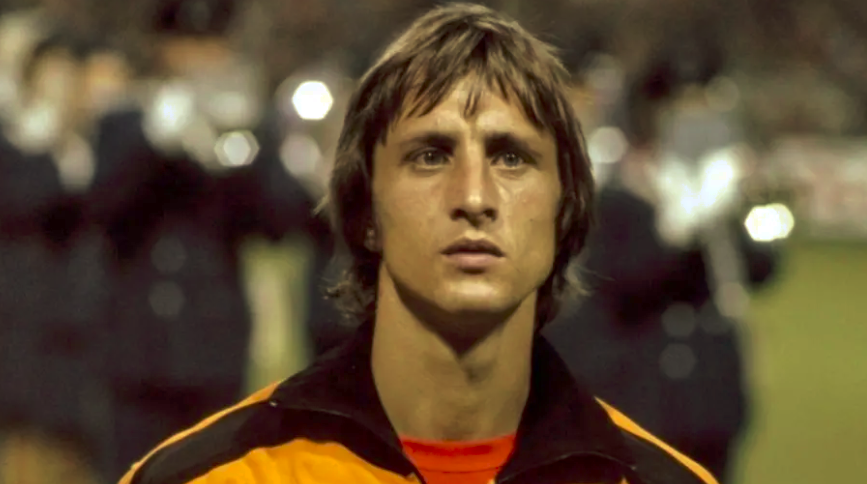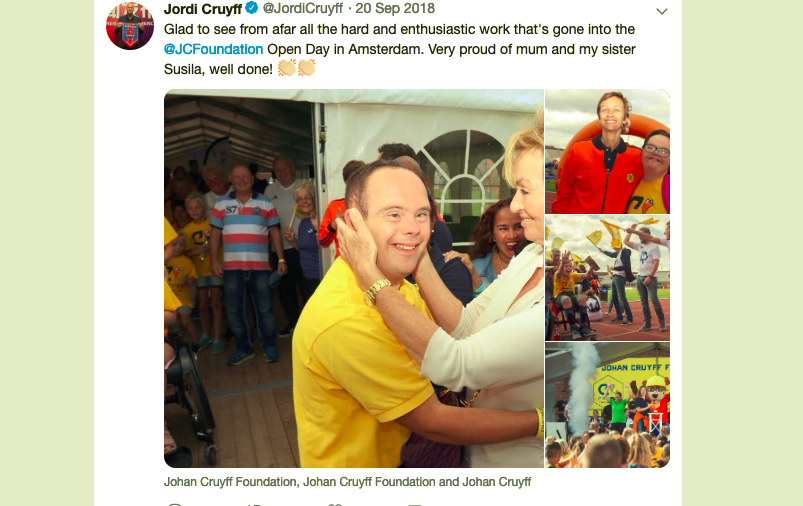February 7, 2019
What Johan Cruyff Could Teach Pastors (And Everyone Else) About Identity and Purpose

Dutchman Johan Cruyff was perhaps the greatest footballer/soccer player ever. Brazil’s Pele might pip him in some polls; George Best was a brief shining superstar.
But as the leader of the Ajax FC and Dutch teams’ “total football” approach in the 1970s, plus a glittering playing and coaching career with the famous FC Barcelona, Cruyff, who died of cancer in 2016, takes the honours surely. Cruyff won the Balloon D’Or (for best player in Europe) three times, and was named player of the tournament at the 1974 World Cup Finals.
His son, Jordi, a great player in his own right, who also played for Barcelona, and won the Premier League with Manchester United, inevitably suffers by comparison, although at a youngish 44 years of age Jordi is regarded as one of the most astute sporting directors in world football, with success at clubs around the globe, and an insight into the game second to none.
But it’s Jordi Cruyff’s insight into his famous father as a father – as a man who came home through the door of an evening – that is most revealing.
For what we find in Johan Cruyff is not a man who fretted and stressed every moment of his life about the huge pressures he faced as player and coach, but someone who, when he closed the door behind him, left that pressure outside.
In a number of interviews Jordi has been asked what it was like growing up with such a famous father who had the fiercely demanding Spanish football press in his face day in day out in his time as coach of Barcelona.
Here’s his constant reply:
It is hard to explain but my father never brought victories home with him and it was the same with defeats. When you heard the keys in the door, you knew he would leave the job outside. He was a family man. He never got cranky at home after losing a game. It is amazing, I was never hit at home or anything like that.
That’s a wonderful observation. Not just that Johan Cruyff did leave the job outside, but that his son knew that he would leave it outside.
Young Jordi had a confidence that the man who walked through the door, victory or defeat behind him, would view his son who greeted him not as an annoyance, or as a distraction, but as a joy in and of himself. And that he would direct his affections towards his family for who they were, not simply for their ability to comfort him in defeat or to be a sounding board for his boasts in victory.
That was the great man’s legacy, his daily practice. He did not allow the role that he was so famous for, and which placed him under enormous pressure, to infect his life as a husband and father in negative ways. Never justified an outburst of anger at home because of a match. Never had to justify an outburst of anger!
Jordi goes on:
Football occupies a large space in my life and my father did leave an important legacy. Every day, someone discusses something that he did. However, I must say that he did say himself that football only occupied a small part of his life. What he loved most, and what perhaps was more important to him than football, was helping in the community and finding solutions to people’s problems.
I like that too. Football obviously occupied an enormous amount of Johan’s time, but as Jordi says here, it only occupied a small part of his life. What does he mean by that? Is not that which occupies our life the same thing that occupies our time?
No. I think Jordi means that Johan did not derive his identity from football. His meaning and self-worth and purpose was not inextricably tied to it. His sense of who Johan Cruyff the man was, was not shaped by the task that occupied most of his daily work. His sense of self would not be destroyed if football were taken away from him.
And that must have been an incredibly difficult mindset to maintain, especially since football/soccer is one of the most identity-defining pursuits for players, managers, supporters, cities and nations, on the planet!
Many people view football exactly how the late great Liverpool FC manager Bill Shankly viewed it. Shankly once said this in an interview:
Someone said to me ‘To you football is a matter of life or death!’ and I said ‘Listen, it’s more important than that’.
But notice what was the most important thing in Johan Cruyff’s life, according to his son?: helping in the community and finding solutions to peoples’ problems.
Serving others was Johan Cruyff’s primary interest, and that could continue whether he was involved in football or not. His primary values and goals in life would not be thwarted by the loss of the “beautiful game”.
I must say, as a pastor of a church reading that, I am humbled by it. From all accounts Johan was not a follower of Jesus, but was the epitome of the thoroughly modern, open minded Dutchman with liberal values.
But he could sure teach a cranky pastor who comes home from a tough leadership meeting a thing or two! His example would undoubtedly be a great one to follow for those getting into ministry roles, who struggle to close the door and leave the clamour behind, and simply live in the moment with their families.
I’m pretty sure that my own children could name a few cranky moments from their own experience of me when under pressures from church.
Now it would be easy to say that church is supposed to take up a lot more of your life than the average job, and that the lines are much more blurry for those in ministry as to where the job begins and ends.
But I actually think our inability to clearly define such lines in our lives is testimony to the fact that we preach an identity in Christ to our congregations that we don’t practice in our own lives or among our families. So often we’re restless, unsettled, distracted, fretting.
Besides all that, to those who do think ministry is unique when it comes to over-reach into the rest of life, I would say they don’t know the mindset of an elite athlete!
I read a recent statistic that one in three Australian Football League players gets divorced shortly after their career finishes. And I’ve read the stats – and heard the stories – about the rates of depression and loss of identity, the addiction issues – among AFL players (and other sports stars) when they hang up the boots, or spikes, for the last time.
So this isn’t just about sports stars, or ministry people, it’s about us all It’s about the danger of tying up our identities in things that were never designed to carry that weight. You may not even be all that religious about either sport or about religion for that matter, but Cruyff’s legacy has something to say to all of us.
Perhaps what I like too about Johan’s legacy is that Jordi, rather than living life in the great man’s shadow and striving to be what he cannot be, enjoys the sunshine and light of the great man’s glory and then gets on with his own life! That speaks volumes about the fact that Johan took his primary joy in Jordi the son, not Jordi the footballer.
Jordi’s Twitter account is replete with pictures of his dad, affection for his dad’s fans, and a focus and interest on the foundation that Johan set up for children with disabilities across the globe.

This is revealing. If Johan’s benchmark in life – his measure of what was worthy – had been football success, even implicitly, then inevitably that would have tainted his less talented son.
Jordi would then run the risk of either seeking – and failing – to emulate him (and there are a thousand therapy sessions in that one), or to sullenly reject his dad’s life in a toxic example of sour grapes. That Jordi can travel the world and be involved in a pursuit in which inevitably people ask “Are you Johan’s son?” is testament to the confidence he had in his dad just being his dad!
When you’re loved and valued unconditionally, there’s great freedom in that, and a liberty that allows you to forge a career that also serves others, by far the best legacy that Johan Cruyff could hand on to a son, compared with any number of World Cup victories..
Written by
There is no guarantee that Jesus will return in our desired timeframe. Yet we have no reason to be anxious, because even if the timeframe is not guaranteed, the outcome is! We don’t have to waste energy being anxious; we can put it to better use.
Stephen McAlpine – futureproof
Stay in the know
Receive content updates, new blog articles and upcoming events all to your inbox.


